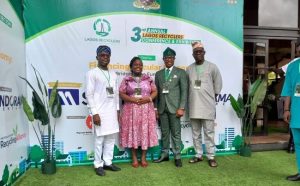The Lagos Recyclers Association (LAGRA) on Friday, September 13, 2024, reiterated the importance of bridging the gap in circular economy financing.

The association restated the importance of the circular economy at its 3rd annual conference and exhibition with the theme, “Financing Circular Economy: Bridging the Funding Gap”, in Lagos.
The Circular Economy is an economic system based on the reuse and regeneration of materials or products, especially as a means of continuing production in a sustainable or environmentally friendly way.
LAGRA is a driving force behind the sustainable transformation of Lagos through responsible recycling and waste management.
In his welcome address, LAGRA’s President, Dr Femi Idowu-Adegoke, restated the importance of financing the circular economy for the sector’s growth.
“In financing the circular economy, Lagos State as the economic powerhouse of Nigeria is at a pivotal point where sustainable development must take centre stage.
“The circular economy offers us a pathway to do just that by minimising waste, promoting resource efficiency and creating economic opportunities.
“However, one of the most significant challenges we face in achieving this vision is bridging the funding gaps that hinder the growth and scalability of circular economy initiatives.
“With a population exceeding 20 million, Lagos generates vast amounts of waste, much of which ends up in landfills, contributing to environmental degradation and public health issues.
“The circular economy, which is based on reusing, recycling, and regenerating materials, presents an opportunity to transform this waste into wealth, reduce environmental impact and create jobs,” the LAGRA president said.
Idowu-Adegoke noted that “the transition to a circular economy is not just about environmental stewardship; it is an economic imperative which has led to the development and launch of Nigeria’s National Circular Economic Roadmap.
“This roadmap focuses on three major sectors captured in our 2021 National Determined Contributions i.e. Waste Management, Renewable Energy, Agriculture and Food Security to achieve circularity by 2050.
“It has the potential to unlock new markets, spur innovation, and drive sustainable economic growth.
“However, realising these benefits requires significant investment—investment that is currently lacking.”
Highlighting the supporting roles of state government in promoting circular economy, the Managing Director, Lagos State Waste Management Authority (LAWMA), Mr Muyiwa Gbadegesin, said the authority would go all out to aid local recyclers in the sector.
“From Lagos’ point of view, it is imperative that we do everything possible to ensure that we have a circular economy in the state.
“This is for good environmental management in order for us to have a healthy, safe and vibrant environment for the well-being of the people and also for our economic growth.
“We generate close to 14,000 tons of waste every day in Lagos, up to 85 per cent of that is not waste, because it has value.
“We are familiar with the mantra – Reduce, Reuse and Recycle – that means, we should reduce how much waste we are generating in the first place. Then we try to reuse as much as possible.
“Then we must also recycle, hence LAGRA, and they have been very active. These are young people who have invested a lot in that sector.
“And what we do as LAWMA to support them, is that we ensure they have what they need to operate, and they need to be licensed so that they can be recognised as official businesses within the sector.
“We ensure that the recyclers are not harassed by other authorities, because once they have that license, they have our stickers, they are able to do their business without too much hindrance,” Gbadegesin said.
He also urged residents of the state to tap into the circular economy drive for their benefits.
“So, our message is that what you think is waste is not waste. It has value. Every waste material that you generate, and you are throwing away has value.
“We want the average Lagos resident to start sorting their waste, separate what is useful from what is not and engage the recyclers within your community to take those useful materials away from you in return for incentives,” he said.
Mrs Titilayo Oshodi, Special Adviser to the Lagos State Governor on Climate Change and Circular Economy, said financing circular economy should be a lifestyle.
“There is a need for us to finance circular economy. First and foremost, there are various areas within the sector of circular economy that we need to bring to bear.
“We need to start layering that, not only as an innovation or solution, but also as a lifestyle. People need more education and enlightenment about circular economy to adopt it as a lifestyle.
“There are different aspects and philosophies of perception around waste in itself. Back in the days, we used to look condescendingly towards those that pack waste.
“Our waste is becoming a resource in transition; people are beginning to make money from responsible disposal.
“So, there is a commerce aspect of it, and establishing the rudimentary models that make commerce thrive is the financing that we are talking about,” Oshodi said.
By Mercy Omoike
